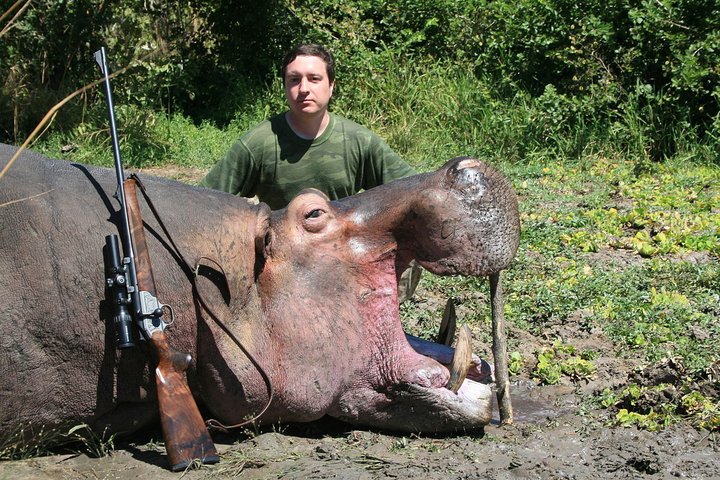
A trophy hunter in Zambia poses with a hippopotamus carcass. | By Lord Mountbatten, Creative Commons license. Via Wikimedia Commons.
Should Humboldt County residents be allowed to mount Cecil the lion‘s stuffed carcass in their living rooms? Should we be able to own elephant-foot trash cans and rhino horn carvings? Taxidermied hippo heads and zebra-skin rugs?
The county’s Fish & Game Advisory Commission thinks so. The 15-member group has drafted a letter to California Senator Mike McGuire opposing the Iconic African Species Protection Act (SB 1487), a bill working its way through the state legislature that would make it illegal to possess certain African animals and their body parts.
First District Supervisor Rex Bohn placed the letter on the agenda for Tuesday’s Board of Supervisors meeting for discussion. The letter urges McGuire not to support the proposed legislation because many of the species identified in the bill aren’t endangered, and in places where they are endangered “strict conservation and management practices are currently in force.”
The letter also claims that trophy hunting actually helps to preserve wildlife populations in Africa.
“The significant funds that hunters pay, including Californians, to hunt non-endangered African species help support anti-poaching activities in Africa, according to concession managers from those countries,” the letter says.
This is a frequent matter of debate, one that pits hunters and firearms groups against conservationists and animal-rights organizations. Advocates say revenues from big game trophy hunting in Africa, where the going rate for a 14-day elephant hunt is about $80,000, according to one guide, go toward conservation programs and discourage poaching in Africa.
Critics dispute those claims. For example, in the wake of the public outcry over the 2015 killing of Cecil, an iconic South African lion gunned down by an American dentist, the Democratic staff of the House Natural Resources Committee issued a report saying trophy hunting revenues frequently get diverted thanks to rampant government corruption and poorly managed wildlife programs. On the whole, the report says, “the evidence shows that trophy hunting is having negative impacts across sub-Saharan Africa.
The arguments were recently rekindled after the Trump administration partially overturned an Obama-era policy banning elephant trophy imports from Zimbabwe and Tanzania. News outlets including the L.A. Times, National Geographic, CNN and USA Today have all explored the question of whether trophy hunting can actually protect animal species.
Senator Henry Stern (D-Canoga Park), the legislator who introduced the Iconic Species Protection Act, said, “There is actually more money for poor African nations and for conservation with these iconic species in the wild.”
Stern’s office quoted renowned scientist Jane Goodall, who spoke out in favor of the bill. “Study after study reveals that the purported economic benefits to communities, promised job creation, and alleged conservation benefits from trophy hunting never materialize,” Goodall said. “In passing the Iconic African Species Protection Act, California will be setting an example that can be championed in state legislatures across the country.”
The “iconic” species identified in the bill include the African elephant, African lion, leopard, black rhinoceros, white rhinoceros, plains and mountain zebra, Jentink’s duiker, hippopotamus and striped hyena.
Would the Lost Coast zebras be banned? It doesn’t appear so. The text of SB 1487 notes that the prohibition wouldn’t apply to artifacts or animals “possessed for wholly noncommercial purposes” and in the state before January 1, 2019.
While the Fish & Game Advisory Commission letter doesn’t cite any specific sources, it says “many concession managers living In Africa” believe the future of certain African animal species will be bleaker if they lose the money offered by big game hunters.
The Board of Supervisors is scheduled to discuss the matter at Tuesday’s meeting, though it’s not clear how the issue is relevant to the mission of Fish & Game Advisory Commission. The stated purpose of the commission, according to the county’s charter documents, is “to serve in an advisory capacity to the Board of Supervisors in all matters concerning fish and wildlife within the County of Humboldt.”
A voicemail message left this morning for Bohn had not been returned by the time this post was published.
# # #
DOCUMENTS:
CLICK TO MANAGE